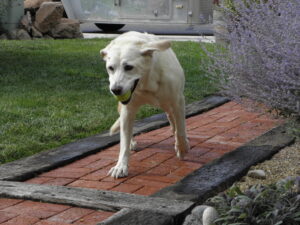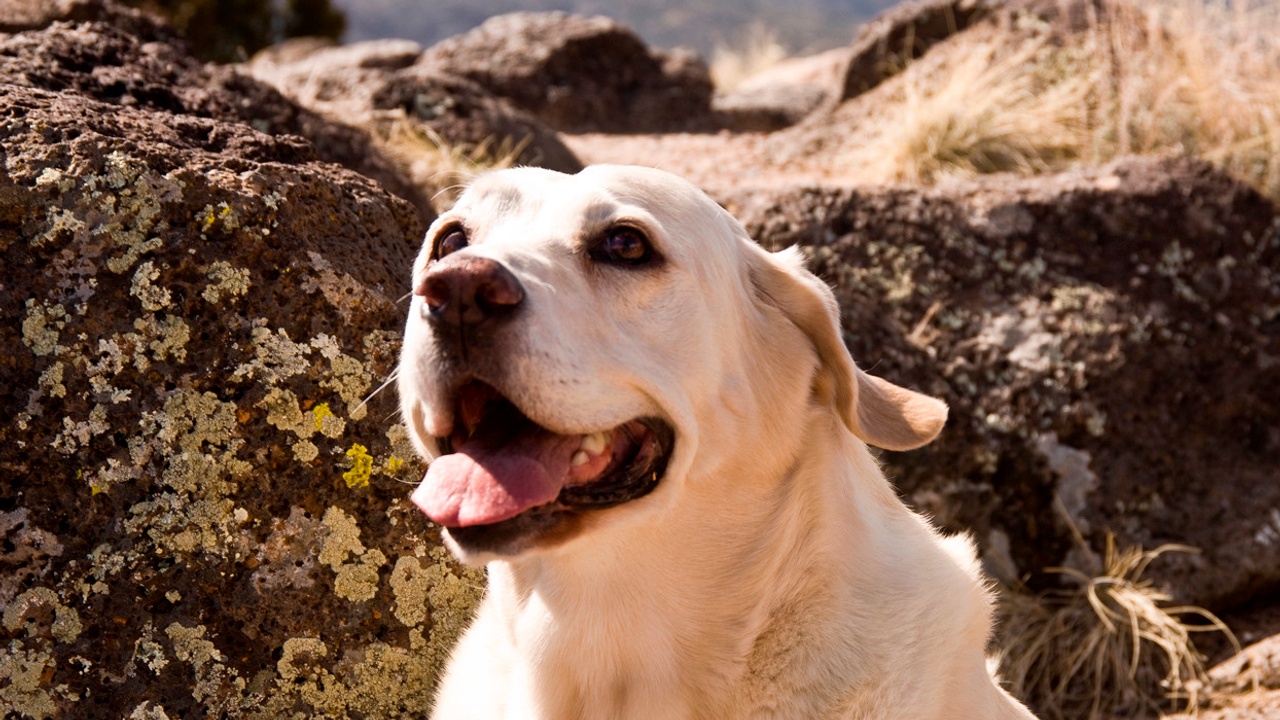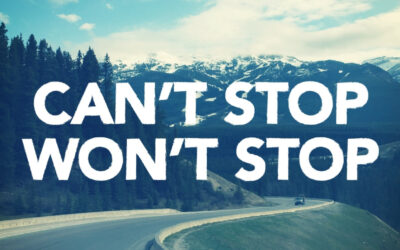A few years ago I had to say good bye to my beloved 13 year old yellow Labrador retriever, Coral. At seven and a half Coral became paralyzed in her hind end from pouncing too aggressively on a tennis ball during a game of fetch. Through months of canine physical therapy, she regained her ability to walk and play. At about the same time Coral was injured, I had a sudden change in my ability to move. One day I was a professional mountain bike racer, and the next day, I was unable to bend over and pick a pen off the floor or walk without a limp.
Coral and I were recovery partners. Healing required many specialists, alternative approaches, patience, dedication and daily exercise. Coral showed me how to manage my injury with grace and dignity. Since she lacked higher cognitive function, Coral was not plagued with a mind that could regret, get depressed, worry about others’ opinions, lose confidence, or doubt her ability. She had an incredible drive and will to live. Her staggering gait and occasional falls did not slow her down. She still ran after tennis balls and barked at dogs twice her size, chasing them until she collapsed. Before her passing, I wrote five lessons Coral taught me about recovery.

1. Daily therapy keeps you moving – move it or lose it
Immediately after Coral’s accident and for several years following, she went to physical therapy, exercising on the underwater treadmill. She also did an obstacle course and daily leash walks to maintain her strength and improve her coordination. When she missed her therapy, there was a noticeable decline in her abilities.
Similarly, when I skip my morning posture routine, I can feel the difference. Keeping my muscles limber and strong is essential, enabling me to continue participating in the sports I most enjoy. It’s just another way I take care of my health, like brushing my teeth. Posture exercises are my daily musculoskeletal workout.
Although we would probably both prefer to abandon this regimen, though Coral did love the turkey treats at therapy, we are dedicated to our healing and continue. The benefits are worth the effort and we both feel better for it.
2. It’s okay to accept help from others – swallow your ego and be vulnerable
When fatigued, Coral could only take but a few steps without collapsing. To aid her, I’d place a support under her belly to relieve the work in her rear. With the assistance her pace quickened, and she’d be fired up to keep going. She seemed to appreciate the help.
In many areas of my life, I want to do everything myself without asking for help. I feel that if I do reach out to others, I will be seen as weak. This belief has been hard to break. However, my hip injury changed this. I couldn’t do it alone like I had with my past knee surgeries. Although initially hesitant, I quickly found many supportive resources. People want to help you. It is their calling just as it is now mine. Building a trusted team around me has been key in my healing.

3. Stay focused on what you want – not on what you’ve lost
Dogs narrow in on what they want – ball, ball, ball. When Coral had a tennis ball, she could be hard to distract, even with food! She knew what she wanted and could not be deterred.
When injured, I found it hard to imagine another reality and obsessed about not being able to ride my bike. I became absorbed in my pain and limitations. Actually, I feared that I would never get better. With time, though, I realized that directing my energy into what I couldn’t do while hurt was greatly slowing my healing. Shifting my thoughts and actions to what was within my skills was empowering and rewarding.
4. It’s all about a positive attitude – believe in yourself and be hopeful about the future
Regardless of how many times Coral fell down, she demonstrated the same determination and enthusiasm to get back up on her feet again. She would reach and jump her front legs forward so she could maneuver her back side and get a good grip in the rear to stand triumphantly again.
Being human, it is easy to feel defeated with repeated failures. We begin to second guess, lose momentum and may even give up. To Coral a slip was merely a temporary set-back to be overcome. She didn’t doubt. While she may have struggled and had to try a few times, she persisted in reaching her goal.

5. Never give up the things you love – don’t accept limitations and chase your ball
Coral never stopped playing fetch. It was a part of her, what she did that brought her extreme pleasure. The only thing that changed was the intensity with which she played. At this point, no longer did I whack the tennis ball with a racket for maximum distance for her to retrieve. Instead, we played a more gentle game of catch, throwing short lobes in the front yard. She still had a great time!
It has been hard for me to get back on the mountain bike since my hip surgery. When you were really good at something, you want and expect to reach that level again – quickly. Letting go of that image of myself and not feeling inadequate on the bike has been difficult. Now it’s about participation, not competition. Although I don’t ride as much as I did, when I do, I remember how fun it is and look forward to more trail adventures.
Remembering Coral’s strength of character keeps me going and smiling when I hurt, feel sorry for myself or want to quit. She was an inspiration and motivating role model. I was lucky to have her at my side during my recovery.



